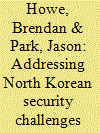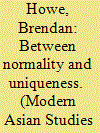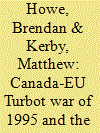| Srl | Item |
| 1 |
ID:
130549


|
|
|
|
|
| Publication |
2014.
|
| Summary/Abstract |
Purpose-Discuss the potential of non-state centric economic cooperation.
Design/methodology/approach-Traditional engagement policies vis-à-vis North Korea have been state-centric, reciprocity-driven and ultimately, unsuccessful. This article proposes the promotion of sustainable, good-faith and meaningful economic exchanges by enrolling the active participation of North Korean elites through alignment with their vested interests.
Findings-Although controversial and even abhorrent from a normative perspective, the approach is eminently pragmatic and necessary to address the limited policy alternatives of an increasingly insecure regime which may eventually be forced to pursue drastic means to ensure its survival.
Practical implications-Non-state-centric international economic engagement is a non-exclusive policy prescription that seeks to broaden the range of viable policy options available to the North Korean regime.
|
|
|
|
|
|
|
|
|
|
|
|
|
|
|
|
| 2 |
ID:
098858


|
|
|
|
|
| Publication |
2010.
|
| Summary/Abstract |
To many observers Japanese decision-making is an enigma that defies conventional analysis. Neither the traditional rational actor model of decision-making, nor alternative pluralist models proposed for the analysis of Western democracies fit the Japanese case. As a result Japanese security policy decision-making is described as 'reactive' or even non-existent. Likewise, the anomaly of Japanese decision-making is ultimately predicted to be resolved through a process of 'normalization' whereby Japanese policy formation evolves into a form that does fit these models. However, this paper contends that the fact that Japan's security decision-making does not fit commonly-used models is due rather to the limitations of those models. Japan's security policy, like that of all states, is gradually evolving, but this does not mean that it is about to become just like the West. This paper addresses how a conjuncture of external factors and internal factors has stimulated important changes in Japanese security policy-making which are frequently missed or misinterpreted by observers. In order to understand Japanese security policy-making, and to chart its future course, a refined cybernetic approach is introduced.
|
|
|
|
|
|
|
|
|
|
|
|
|
|
|
|
| 3 |
ID:
088066


|
|
|
|
|
| Publication |
2009.
|
| Summary/Abstract |
This paper examines how and why in March 1995 certain elements of the Canadian government decided to take unilateral forceful action against foreign fishing off the Grand Banks and go against a long tradition of cooperation and multilateralism. In particular, it will address to what extent existing models of decision-making (in particular rational and bureaucratic models) adequately explain the process that went on in Ottawa at this time. The findings are that even though the bureaucratic politics model of decision-making can be used in a parliamentary structure like Canada, it is insufficient to explain Canadian decision-making processes during the Turbot War, and thus must be supplemented by a more inclusive cybernetic approach.
|
|
|
|
|
|
|
|
|
|
|
|
|
|
|
|
| 4 |
ID:
108534


|
|
|
|
|
| Publication |
2011.
|
| Summary/Abstract |
For the past 15 years, the concept of human security has been promoted as a significant extension of traditional security studies. However, while human security
has been present and visible in academic and practitioner discourse, it is yet truly
to capture the imagination of specialists. Partly this is a result of the belligerent
direction global politics has taken in the new millennium. Partly, however, it results
from conceptual inadequacies internal to the notion itself. This article confronts
the latter problem. It first examines the emergence of human security within the
wider security studies literature, homes in on debates about human security, and
draws important parallels between development and human security. It then
builds on this to restate human security as freedom from fear and freedom from
want, and to demonstrate how this conceptualization can be understood as a dual
responsibility initially to protect and subsequently to provide. It finally considers
whether a responsibility to intervene is generated by this approach. The brief conclusion summarizes the argument that this conceptualization generates a fresh
way forward for human security studies.
|
|
|
|
|
|
|
|
|
|
|
|
|
|
|
|
| 5 |
ID:
104112


|
|
|
|
|
| Publication |
2011.
|
| Summary/Abstract |
Development in Laos has occurred slowly, with uneven distribution and significant negative effects. This article challenges the simplistic assumption of human development and human security as mutually reinforcing processes. It suggests a holistic approach addressing simultaneously competing demands from the perspectives of the most vulnerable sectors of society.
|
|
|
|
|
|
|
|
|
|
|
|
|
|
|
|
| 6 |
ID:
068537


|
|
|
| 7 |
ID:
175404


|
|
|
|
|
| Summary/Abstract |
From a developmental perspective, South Korea would seem to have long ago put the challenges of the Middle Income Trap behind it. This supposed economic Miracle on the Han River has been matched by a similar political miracle with democratic transition followed by consolidation. Yet middle income economic conceptualization is too narrow, with contemporary observers taking into account the political economy of change as well, emphasizing how development paths are often the outcome of a struggle between those who benefit from the status quo and those who seek change “ a broader Transformation Trap. Likewise, even after transition and consolidation, the quality of democratic governance can remain poor, or thin. In South Korea, as with many Asian societies, the balance of power is tilted in favor of forces preserving the status quo. This article examines South Korea's escape from the developmental Transformation Trap through the interplay of state and the economy. It considers state-society achievements as well as ongoing challenges of the political Transformation Trap. It concludes with ongoing and future challenges along the economy-society nexus.
|
|
|
|
|
|
|
|
|
|
|
|
|
|
|
|
| 8 |
ID:
067184


|
|
|